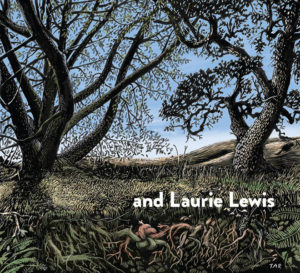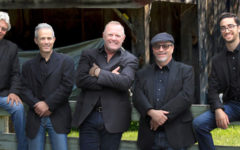
A Grammy Award-nominated singer, songwriter and phenomenal fiddler, Laurie Lewis has plied her craft in bluegrass circles for the better part of the past 40 years. At a time when it was rare to find women playing music of that vintage variety, Lewis was creating her own niche in the seminal West Coast music scene, environs she became enthralled with early on. Raised in Berkeley, California, she was lured to the local folk and festival scene while barely in her teens, although as fate would have it, she wouldn’t release her first album, 1986’s Restless Rambling Heart, until the age of 36, having dabbled in an array of other endeavors — working in a gas station, running a violin shop and studying modern dance, among them. Nevertheless, she’s more than made up for lost time by releasing some 20 albums since, all recorded for a variety of labels before she eventually started her own, Spruce & Maple Music.
Her early outfits — Phantoms of the Opry, the Good Ol’ Persons, and the Grant String Band — helped establish her fiddle and vocal finesse initially, but it didn’t take long before Lewis was gaining recognition both on her own and in the company of her frequent collaborator, mandolinist Tom Rozum. Pundits and the public caught up with her quickly. She has been the recipient of two Grammy nominations, two International Bluegrass Music Association Female Vocalist of the Year awards, nods for IBMA’s Song of the Year and Album of the Year (as part of True Life Blues), as well as the respect of her peers. Her song, Swept Away, recorded by Missy Raines and The First Ladies of Bluegrass, was nominated for Song of the Year in 2019. These days she is recognized as a leading light as far as bluegrass in general, and the Bay Area’s contribution to the genre in particular.
Linda Ronstadt is one of many artists who have sung Lewis’ praises. She hailed her by saying, “Her voice is a rare combination of grit and grace, strength and delicacy. Her stories are always true.” Still, Lewis doesn’t stop there. Aside from mentoring a new generation of young musicians, she’s made her mark as a producer, songwriter, and educator. Laurie has been, and remains, an inspiration to young women seeking to plot their way forward by building on a deep dedication to bluegrass’ future and to being her own person.
Lewis’ upcoming new release, and Laurie Lewis, builds on that trajectory. It features some traditional songs — Will the Circle Be Unbroken and You Are My Flower, among them — as well as an array of originals that address contemporary concerns such as climate change and the disconnect between people and the planet. Both poignant and personal — and with an array of special guests to boot — it marks another accomplishment in a career where success has become the norm.
Here’s the duet version of Circle with Tom Rozum, not the familiar Carter family version, but the way it was recorded by The Monroe Brothers in 1936.
Recently, Bluegrass Today had the opportunity to talk with this indisputable icon and get her thoughts about her new album, and her trajectory in general.
How did the idea for this new album come about initially? And how did you choose which songs to include?
Initially, I wasn’t planning on making a duets album. I just wanted to record a couple of songs with a couple of friends. I think the first one was You Are My Flower, which I have always wanted to record as a duet. When Molly Tuttle was in town and had a little time, we got together and sang it, and it just made me so happy!
When Tatiana Hargreaves was in town, we got together to record Mama Cry, just because I loved the way she interpreted it on her fiddle. That was so fun and easy, and it led me to suggest that we do The Pika Song, a tune which I had recently written. Suddenly, I had three songs and the beginning of an album. We found the rest of it rather easily.
This album probably would not have been possible if I hadn’t started playing duo shows with Tom Rozum many years ago. It was terrifying to be so musically naked at the beginning, for us band musicians, but after awhile we learned to love the loose weave of the instruments and the focus that the emptiness places on the vocals and lyric content. When we first heard the Monroe Brothers’ version of Will the Circle be Unbroken, we fell in love with the harmonies, and the subtle twist in the chorus lyric.
Can you give us some idea of how your original songs come about? Do you come up with a subject that you really want to share? Where and how do you find your muse?
The short answer to these questions is ‘yes.’ All of that and more. My songs come to me easily, but also through a lot of pain, trial and error, and just plain hard work. My inspirations come from whatever is tickling my brain or fueling my emotions. This is Our Home on the new album was inspired by reading a story about the orca who kept her dead calf afloat for two weeks in what seemed like an obvious act of grief. As a near-lifetime Bay Area resident, I can’t help but be shaped by and drawn to the ocean. Old Friend was mostly written while on a trip with a dear friend. I probably most often find my muse in the natural world around me, and of course in the cauldron of life’s many heartbreaks.
You were introduced to bluegrass as a young girl. How did that interest eventually gel to the point where you decided to make it a career more than 20 years later?
I think it took me that long to stumble into the community of bluegrass musicians in the Bay Area. As a banjo-playing teenager, I didn’t know anyone else who was remotely interested in this music that had so stirred me. And bluegrass, as you know, is really a communal music. I gave it up and went on to other interests. And once I found the community, I guess it took me a long time to actually commit to trying to make a living through music. It’s scary! Or it was for me.
Nowadays bluegrass seems as focused on populist precepts as it does on more traditional techniques. How do you manage to find a bridge between the two — holding on to an audience that favors vintage bluegrass versus the younger audiences that flock to festivals and go for a more modern sound?
I really have no idea about how one does this. I play what I want to play the way I hear it — or as capable as I am of playing it. One’s style is defined only by one’s limitations. I only hope that people will hear it and like it, share it with their friends, and come back for more.
After all the accolades you’ve achieved, do you find yourself consciously trying to meet the hight bar you established early on? Are you in any way competing with yourself?
Of course, I am competing with myself. I don’t want to just repeat myself in the songs I write. Nor do I want to just rest on my laurels, such as they are. As I have aged, my voice has lost elasticity and the high notes that I used to hit with relative ease. But I feel that I have learned more about how to put across a song, and sing from my heart. And, I have developed more warmth in the lower register. Hopefully, that accounts for something in the balance.
The new album seems to encapsulate your career. So have you thought about how you’ll follow it up?
My band, the Right Hands, is about to start recording an album, which will be super-fun and exciting after the nakedness of these duets. And I have a number of songs that just don’t seem to fit anywhere, so I may just record another solo album after the band project, inviting whoever fits the song the best to record them with me. I have a list of recording ideas as long as my arm, and I plan on just working through them.
Finally, why do you think bluegrass has such lingering appeal?
I think that the accessibility of the musicians to the audience has something to do with it. And the fact that we don’t need a lot of props to play it. Just a good instrument and enough space to sling a fiddle. The subject matter is often about the struggles of ordinary people — work or lack thereof, love and loss of love, disappointment, and solace. I am also personally attracted to the natural imagery in so many classic bluegrass songs, and I suspect others are, too.
and Laurie Lewis is scheduled for a March 27 release.








